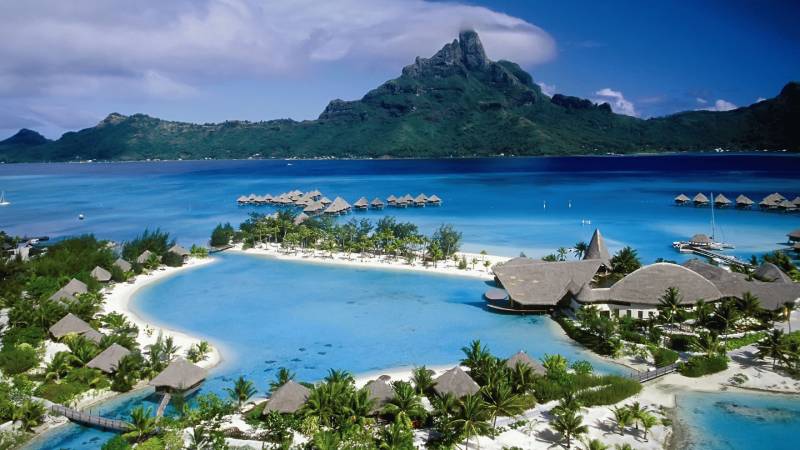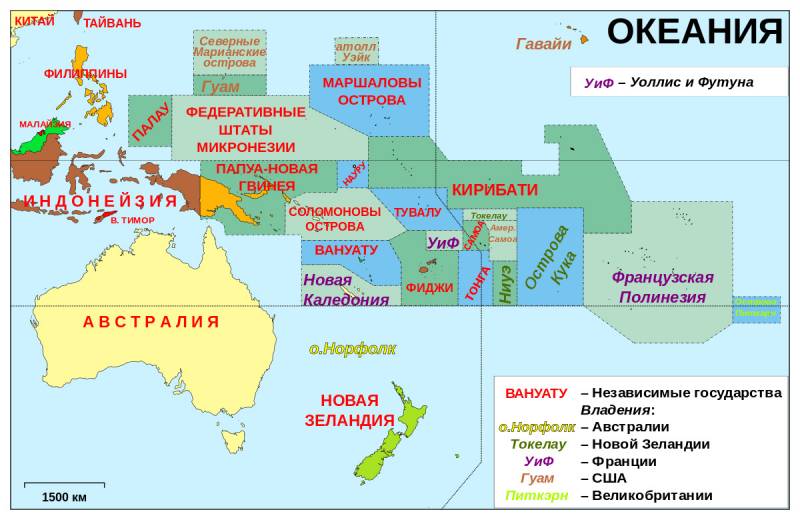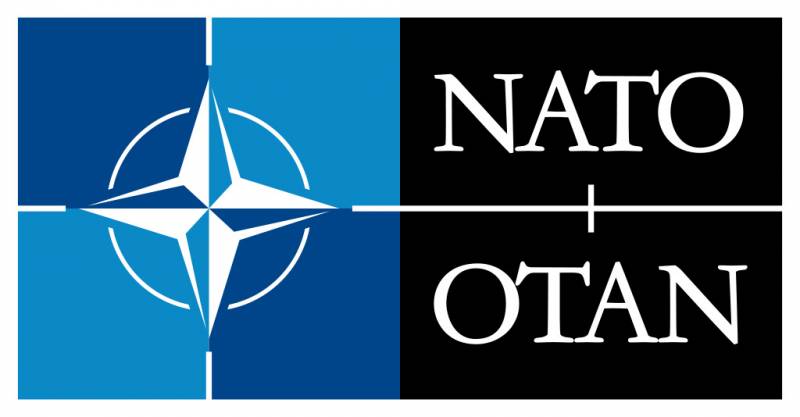Oceania will be taken under protection ... and everything that is there will be divided

Region of special disregard
The unhurried, but no less unceremonious division of Oceania is a process that began a very long time ago. Two Pacific alliances have formed in the region. One is tied to Latin American countries with access to the Pacific Ocean. The second was formed relatively recently, and, in addition to the United States, Japan, Australia and New Zealand joined it.
As for the small island states of Oceania, they certainly have a choice, but this choice is unlikely to be in favor of Latin America. The choice will have to be made between the "NATO Spill" Pacific Alliance and China, which is actively promoting its foreign policy in the region.
By and large, the Pacific islands have no choice, since they have vast maritime lands, but in fact they do not have the forces and means that would help defend their sovereignty and territorial integrity.
Oceania is a region where island states do not have their own fleet, especially the ground armed forces (it is simply impossible to place them on microscopic islands). The exceptions, of course, are New Zealand, Fiji, Papua New Guinea and the Solomon Islands, but the last three, despite their rather large size, also depend on the patronage of neighboring large states.
Recently, there has been a tendency to increase the presence of NATO countries in the territorial waters of the region, while China also makes its claims to the functions of a "regional security service". It reminds me more and more of the Sharovsky principle “Take everything and share”. So far, only fisheries are divided, but, given the conflict situation in the South China Sea, it is also possible to delimit the spheres of military influence.
It is impossible not to recall how brave sailors turned into diabetics and heart patients. In antiquity and the Middle Ages before European colonization, the population of Oceania, especially Polynesia, had no equal in the art of navigation and navigation by the stars.
If the ancient Greeks made mainly coastal voyages, which led to coastal colonization in the form of city-states on the Mediterranean, Black and Azov seas, then the Polynesians were not afraid to sail their ships from Malaysia (where their roots come from, since they all speak Austronesian languages) to Easter Island and from Hawaii to New Zealand.
Until now, many New Zealand Maori can easily answer the question - “what kind of boat are you from”, since the national memory even preserves the number of boats with their ancestors that sailed from Tahiti to the shores of forested islands with an unusual climate.
Do natives remember Cook?
Now, most of the island countries of Oceania practically do not have their own fleet. Even the professional fishing fleet is underdeveloped, although many islanders fish privately off the coast or fish for shells, pearls and seafood at depth. It's easier to lease huge territorial waters to large players in the fish market.
What is the reason? Obviously, in the colonization policy of the whites, primarily the Anglo-Saxons, the French - to a lesser extent. In New Zealand, the enslavement of the Maori failed because of the high military skill of the latter. Thinking that they were dealing with illiterate natives, the British apparently got a break in the pattern when they saw how the Maori, who did not even know iron before their arrival, build powerful fortresses from wood coated with refractory natural compounds, which the British, if they took, then at a cost big sacrifices.
The uprising of the field commander Titokovar was the largest in stories Great Britain in terms of the amount of damage inflicted on British troops, much more than during the Scottish uprising of Wallis. The situation was complicated by the fact that a significant number of British Maori officers, who received an excellent education in England itself, including in the field of fortification, went over to the side of the rebels.
In addition to this, after the Musket Wars, the Maori owned firearms. weapons without exception, including women and children, and it has accumulated a huge amount, as recently in Afghanistan and Chechnya. As a result, the British agreed to sign a number of treaties that limited their rights to land. This was nowhere else in Anglo-Saxon history.

At the edge of the world and ... the abyss
But in the rest of Oceania nothing similar happened. Since there was nothing but fish resources on the islands, the Europeans took the local population with money, which led to a tough exploitative policy. Against the backdrop of economic expansion in China, the island population was forced to harvest trepang for miserable pennies to be sent to this country, which is still its main consumer.
The Polynesians, Micronesians and Melanesians were finished off by alcohol, which they did not know before the arrival of the whites, and infections brought by the Anglo-Saxons (leprosy, tuberculosis, influenza, syphilis), to which the islanders had no immunity. Well, in more recent times, the Polynesians (Melanesians and Micronesians to a lesser extent) completely lazy and unaccustomed to professional fishing “got hooked” on fast food and sweets, which caused a monstrous level of obesity.
As a result, a number of Polynesian islands are world leaders in overweight, diabetes and heart disease. Their ancestors ate fish and seafood, but now it’s easier for them to buy a hamburger and french fries than to go out to sea for fish, let alone dive.
In Micronesia and Melanesia, the culture of fishing and diving on air retention has remained, but still these activities cannot cover their territorial waters. Maybe not even because of laziness, but rather because of the lack of a population that will effectively use the vast sea spaces owned by their countries.
Without funds and without a fleet
Sea, more precisely - oceanic, states have lived and live without their own fleet. Of the countries of Oceania, only Fiji, Papua New Guinea, and Tonga have their own small fleet. And even then, all of them are represented only by the coast guard, which carries out rescue and border functions, as well as fisheries supervision. The rest do not have their own Navy. Its functions are provided by the Australian, New Zealand and US navies.
Naturally, someone had to control the safety in the richest fish waters, because they themselves are not able to. And the claims of the big powers to such expanses of the Pacific Ocean, teeming with fish, are very significant and economically well-founded.
If in other regions there are vast neutral waters in which the catch is regulated by international agreements, then in the southern part of the Pacific everything is divided between microscopic islands. How is it possible that wealth disappears: as the Ukrainian proverb says, “it’s not for you that your mother raised a flower.”
Mother nature raised fish resources for them - for large exporters and consumers of fish, who are an eyesore that these resources on the islands will a priori be unclaimed. To that end, the Oceania Maritime Security Initiative exists.
This act allows the US Coast Guard to maintain law and order in the maritime areas of the region using the US Navy in coordination with the Western and Central Pacific Fisheries Commission. However, now this initiative is militarized more and more.
When did the Chinese come?
Until recently, the United States only allowed Australia and New Zealand into its Maritime Security Initiative, replacing most of the region's island nations with their own armies, which don't exist. Japan was added later, but in 2021–2022. China tried to penetrate Oceania in order to ensure maritime security.
This coincided with the escalation of China's military presence in the South China Sea, where its conflict with the United States and Taiwan, and to a lesser extent with Vietnam, has long been brewing. At the beginning of 2022, official Beijing proposed a maritime security pact to ten countries in Oceania. Negotiations in Fiji proved fruitless for China.
Unlike the NATO countries, China decided to go ahead, Chinese Foreign Minister Wang Yi immediately proposed cooperation not only in protecting fisheries from poachers and foreign fishermen, but also touched upon the areas of general military security. The leaders of the island states immediately refused. China has apparently gone too far in offering all sorts of security services to the islands, ranging from police and cybersecurity training to, and what appears to be entirely unacceptable, marine mapping.
Whatever the economically backward countries, even their leaders realized that the last moment smacks of delimitation of borders. Well, the demands of China to provide in exchange for greater access to natural resources (they are not limited to fishing, there are also coconut palms and phosphates) completely ruined the situation.
The situation was complicated by the fact that the dwarf states of Oceania receive significant budget revenues from their vote at the UN on the recognition of Taiwan, maneuvering between the PRC and the ROC, depending on who offers more money (this, however, also applies to some unrecognized republics of the former USSR , the islands have not yet profited from the DPR and LPR, but they can potentially profit from recognizing them and other former Ukrainian territories as Russian).

NATO in Oceania
Back in 2016, the United States conducted exercises near the Pacific Island States as part of the Initiative. Destroyers participated in these exercises, which does not fit in with the safety of fishing: why are such ships needed to neutralize poachers? Two years after that, Japan joined the Initiative, which immediately stated that it was doing this to stop illegal shipping in the region of North Korean ships.
This, you see, can be regarded as a political reason. It is curious that this happened in the silence of South Korea, whose fishing vessels are engaged in fishing, in particular, in the territorial waters of Kiribati.
This fall, another player joined the security program - Canada, which, although it has access to the Pacific Ocean, is too far from Oceania and has its own vast fishing grounds. The United States, Canada and Japan conducted the Noble Raven 22 exercise.
These exercises took place on the territory from Guam to the South China Sea, practically bordering on the sea area claimed by China. Destroyers, frigates and vertical replenishment ships were present. Although the Coast Guard also figured. Official press releases indicated that the exercise was aimed at combating piracy in Oceania.
The redistribution of the waters of Oceania has three very transparent goals.
First – get access to the fishing resources of the South Pacific Ocean, which is natural.
The second - to achieve military superiority in the region against the background of the NATO conflict with China.
The third – gain access to the land resources of the countries of Oceania. But they are really scarce. Basically, Papua New Guinea is rich in them. As long as it is not heavily affected by the Initiative, it certainly does not have such huge ocean areas as the dwarf countries of Oceania.
But Australia has been reconstructing abandoned American military bases there since 2020. True, they will still cry with such a criminal region, where in the cities they shoot at hotels with foreigners, and in the countryside they are sometimes even eaten ...
Information